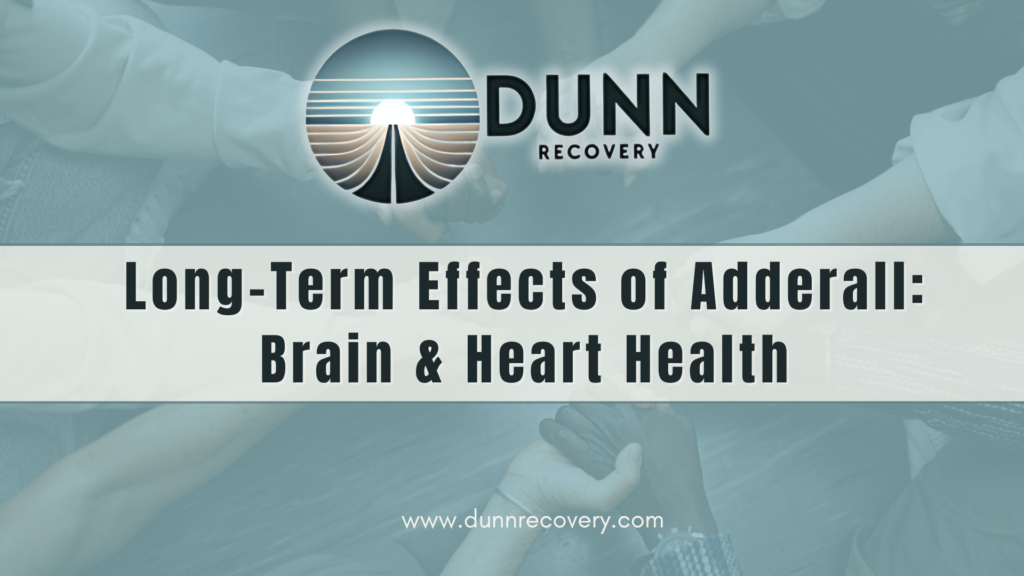The long-term effects of Adderall can be profound and far-reaching, affecting multiple body systems and cognitive functions. As a prescription stimulant medication combining amphetamine and dextroamphetamine, Adderall is primarily prescribed to treat Attention Deficit Hyperactivity Disorder (ADHD) and narcolepsy. While therapeutically beneficial when used as prescribed, extended Adderall use—especially misuse or abuse—can lead to serious health consequences that may persist long after discontinuation.
At Dunn Recovery, we’ve witnessed firsthand the devastating impact that prolonged Adderall use can have on individuals seeking treatment at our facilities. Our clinical team has extensive experience helping clients navigate the complex physical and psychological effects of stimulant medications. This comprehensive guide explores the far-reaching consequences of extended Adderall use on both physical and mental health.
Neurological Impact: Long-Term Effects of Adderall on the Brain
How Adderall Affects Brain Chemistry
Adderall works by increasing the availability of neurotransmitters like dopamine and norepinephrine in the brain. These chemicals are crucial for attention, motivation, and mood regulation. However, with prolonged use, Adderall can disrupt the brain’s natural ability to produce and regulate these neurotransmitters.
Dopamine Dysregulation: Long-term use can deplete dopamine reserves and alter dopamine receptors, potentially leading to:
- Decreased natural dopamine production
- Reduced sensitivity to natural rewards
- Persistent mood dysregulation
Research published in the Journal of Neuroscience suggests that extended amphetamine exposure may cause lasting changes to dopamine signaling pathways, even after the medication is discontinued.
Structural Brain Changes
Studies utilizing advanced neuroimaging techniques have identified concerning structural changes in long-term Adderall users:
- Gray Matter Alterations: Reduction in gray matter volume in certain brain regions, particularly those associated with decision-making and impulse control
- White Matter Integrity: Potential disruption to white matter tracts that facilitate communication between brain regions
- Neuronal Damage: Evidence of oxidative stress and potential neurotoxicity in animal models of chronic amphetamine exposure
At Dunn Recovery, our rehabilitation programs address these neurological changes through evidence-based approaches that support brain healing and recovery of cognitive function.
Is Adderall Neurotoxic?
The question “is Adderall neurotoxic?” remains a topic of ongoing research. Evidence from both animal studies and human observations suggests that at high doses or with prolonged use, Adderall may have neurotoxic properties:
- High doses can increase oxidative stress in the brain
- Prolonged exposure may lead to inflammation of neural tissues
- Some studies indicate potential damage to dopamine terminals in certain brain regions
While therapeutic doses under medical supervision may minimize these risks, misuse or abuse significantly increases the potential for neurotoxic effects. The specialists at Dunn Recovery carefully assess each client’s neurological health and design individualized treatment plans to address potential neurotoxicity.
Cardiovascular System: Long-Term Effects of Adderall on Heart Health

Adderall Cardiovascular Damage
Stimulants like Adderall increase heart rate and blood pressure, placing additional strain on the cardiovascular system. With extended use, this can lead to serious cardiovascular complications:
Short-term effects include:
- Elevated blood pressure
- Increased heart rate
- Vasoconstriction (narrowing of blood vessels)
Long-term cardiovascular issues may develop, including:
- Hypertension (chronic high blood pressure)
- Arrhythmias (irregular heartbeat)
- Cardiomyopathy (disease of the heart muscle)
- Increased risk of heart attack and stroke
A study published in JAMA Internal Medicine found that adults using prescription stimulants had a significantly higher risk of cardiovascular events compared to non-users, especially with long-term use.
Risk Factors and Warning Signs
Certain individuals may be at higher risk for Adderall-related cardiovascular damage:
- Those with pre-existing heart conditions
- Individuals with a family history of heart disease
- People with hypertension
- Older adults
Warning signs that should prompt immediate medical attention include:
- Chest pain or pressure
- Difficulty breathing
- Irregular heartbeat or palpitations
- Extreme fatigue with minimal exertion
- Fainting or dizziness
At Dunn Recovery, all clients undergo comprehensive cardiovascular assessment as part of the initial evaluation process, ensuring that treatment plans address any existing heart conditions while supporting cardiovascular health during recovery.
Psychological Impact: Long-Term Effects of Adderall on Mental Health
Mood Disorders and Emotional Regulation
Long-term Adderall use can significantly impact mood regulation and emotional stability:
- Depression: As the brain’s natural dopamine production becomes impaired, many users experience persistent depression, especially during withdrawal.
- Anxiety: Chronic stimulant use can heighten the body’s stress response, leading to generalized anxiety or panic disorders.
- Mood Swings: The cycle of stimulation and crash can create dramatic mood fluctuations that persist even after discontinuation.
Our clinicians at Dunn Recovery utilize a combination of medication management, therapy, and holistic approaches to stabilize mood and rebuild emotional resilience during recovery.
Psychosis and Thought Disorders
Perhaps the most concerning Adderall long-term psychiatric effects are those related to psychosis and thought disorders:
- Stimulant-Induced Psychosis: Characterized by paranoia, hallucinations (visual and auditory), and delusions
- Persistent Thought Disturbances: Disorganized thinking, racing thoughts, and difficulty concentrating
- Sensory Hypersensitivity: Heightened sensitivity to light, sound, and touch
Research indicates that these symptoms can persist for weeks or months after discontinuation in some cases. In rare instances, individuals may develop persistent psychotic disorders even after the drug has been eliminated from their system.
Dunn Recovery’s psychiatric team specializes in treating stimulant-induced psychosis and offers comprehensive care for clients experiencing these challenging symptoms.
Cognitive Impairments
Long-term Adderall use may result in various cognitive impairments:
- Memory Problems: Difficulties with working memory and recall
- Executive Function Deficits: Challenges with planning, organization, and decision-making
- Attention Issues: Paradoxically, long-term stimulant use can worsen attention problems when the medication is discontinued
A systematic review published in Neuropsychopharmacology found that chronic amphetamine users demonstrated significant impairments in several cognitive domains compared to non-users.
Physical Health: Long-Term Effects of Adderall on Body Systems
Gastrointestinal System
Adderall’s effects extend beyond the brain and heart to impact multiple body systems. The gastrointestinal system often bears significant consequences:
- Appetite Suppression: Leading to malnutrition and weight loss
- Reduced Blood Flow: Affecting digestive function and nutrient absorption
- Increased Risk of Ulcers: Due to reduced protective mucus production
- Chronic Constipation: From decreased gut motility
At Dunn Recovery, our nutritional rehabilitation program addresses these issues through personalized meal planning and supplementation to restore optimal gastrointestinal health.
Endocrine and Metabolic Effects
Long-term Adderall use can disrupt various hormonal and metabolic processes:
- Growth Hormone Suppression: Potentially affecting muscle development and repair
- Altered Glucose Metabolism: Leading to insulin resistance in some users
- Disrupted Sleep-Wake Cycles: Affecting melatonin and cortisol regulation
- Thyroid Function Changes: Potentially causing hyper or hypothyroidism
These disruptions can have cascading effects throughout the body, contributing to the overall burden of Adderall health risks.
Dental and Oral Health
A frequently overlooked aspect of Adderall damage to body systems is its impact on dental and oral health:
- Bruxism: Excessive teeth grinding and jaw clenching
- Xerostomia: Chronic dry mouth increasing risk of tooth decay
- Periodontal Disease: Reduced saliva flow and poor oral hygiene increasing gum disease risk
- Enamel Erosion: From acidic saliva and dehydration
The comprehensive approach at Dunn Recovery includes dental evaluation and care as part of our holistic treatment protocol.
Adderall Permanent Effects: What May Not Recover

Potential Irreversible Changes
While many effects of Adderall can improve with abstinence and proper treatment, some changes may be permanent or require extended recovery time:
- Cardiovascular Remodeling: Heart enlargement or structural changes may not fully reverse
- Neurocognitive Deficits: Some cognitive impairments may persist, especially with heavy, prolonged use
- Psychiatric Vulnerability: Increased susceptibility to stress, anxiety, and mood disorders
- Metabolic Alterations: Changes to metabolism and endocrine function that persist long-term
It’s important to understand that individual factors such as genetics, duration and intensity of use, and overall health significantly influence the likelihood of permanent effects.
Factors Influencing Recovery Potential
Several key factors influence how completely an individual may recover from long-term Adderall effects:
- Age of First Use: Earlier use during brain development increases risk of permanent changes
- Duration of Use: Longer periods of use correlate with more persistent effects
- Dosage and Pattern: Higher doses and binge patterns increase damage potential
- Co-occurring Substance Use: Combining with other substances may compound damage
- Individual Health Factors: Pre-existing conditions and genetic factors play significant roles
Adderall Addiction
Understanding Stimulant Dependence
Adderall’s mechanism of action makes it highly addictive, especially when used improperly:
- Physical Dependence: The body adapts to the presence of the drug, requiring it for normal functioning
- Psychological Dependence: Beliefs about needing the drug to perform, focus, or feel normal
- Tolerance Development: Requiring increasing doses to achieve the same effects
The line between therapeutic use and dependence can blur, particularly when individuals begin to self-adjust dosages or use Adderall for purposes other than prescribed.
Adderall Addiction Symptoms
Recognizing the signs of Adderall addiction is crucial for early intervention:
Behavioral Symptoms:
- Using higher doses than prescribed
- “Doctor shopping” to obtain multiple prescriptions
- Spending significant time and resources obtaining Adderall
- Continuing use despite negative consequences
- Neglecting responsibilities and relationships
Physical Symptoms:
- Sleep disturbances and insomnia
- Significant weight loss
- Dental problems
- Cardiovascular issues
- Tremors and motor disturbances
Psychological Symptoms:
- Anxiety and panic attacks
- Paranoia or suspiciousness
- Mood swings and irritability
- Depression when not using
- Cognitive difficulties
At Dunn Recovery, our clinical assessment process thoroughly evaluates all aspects of Adderall dependence to create targeted treatment plans.
Adderall Withdrawal
The Withdrawal Process
When someone dependent on Adderall stops using, they typically experience a withdrawal syndrome characterized by:
Initial Phase (1-3 days):
- Extreme fatigue and increased sleep
- Intense hunger
- Irritability and anxiety
- Strong cravings
Acute Phase (1-2 weeks):
- Depression and anhedonia (inability to feel pleasure)
- Concentration difficulties
- Sleep disturbances
- Continued cravings
Protracted Phase (weeks to months):
- Persistent mood fluctuations
- Gradually improving energy levels
- Intermittent cravings
- Cognitive improvement
The withdrawal process can be challenging, and many individuals benefit from medical supervision during this period. Dunn Recovery offers medically-supervised detoxification services to ensure safety and comfort during this critical phase.
Managing Withdrawal Symptoms from Long-Term Adderall Use
Effective management of withdrawal symptoms is essential for successful recovery:
- Medical Monitoring: Regular assessment of vital signs and mental status
- Nutritional Support: Balanced nutrition to restore depleted resources
- Sleep Restoration: Interventions to reestablish healthy sleep patterns
- Psychological Support: Therapy to address emotional symptoms and cravings
Adderall Addiction Treatment
Comprehensive Treatment Approaches
At Dunn Recovery, we utilize a multi-faceted approach to treating Adderall addiction:
Medical Interventions:
- Supervised detoxification
- Management of co-occurring conditions
- Nutritional rehabilitation
- Sleep restoration
Psychological Therapies:
- Cognitive-Behavioral Therapy (CBT)
- Motivational Enhancement Therapy
- Contingency Management
- Mindfulness-Based Relapse Prevention
Social and Community Support:
- Family therapy and education
- Peer support groups
- Community reintegration planning
- Vocational rehabilitation
Recovery Timeline and Expectations After Long-Term Adderall Effects
Recovery from long-term Adderall use is typically characterized by several phases:
Early Recovery (1-3 months):
- Focus on physical stabilization
- Managing post-acute withdrawal
- Building foundational recovery skills
- Addressing immediate life concerns
Middle Recovery (3-12 months):
- Deeper psychological healing
- Lifestyle restructuring
- Skill development for long-term sobriety
- Addressing underlying issues
Long-term Recovery (1+ years):
- Maintenance of recovery practices
- Continued neurological healing
- Life purpose and meaning development
- Monitoring for potential long-term effects
At Dunn Recovery, we recognize that recovery is a personal journey that continues long after formal treatment ends. Our aftercare programs provide ongoing support to maintain progress and address challenges that arise during the recovery process.
Prevention and Reduction of Long-Term Adderall Effects
Safe Use Guidelines
For individuals who are prescribed Adderall, following these guidelines can reduce the risk of long-term effects:
- Take exactly as prescribed by your healthcare provider
- Attend all follow-up appointments for monitoring
- Report any concerning side effects promptly
- Never adjust dosage without medical consultation
- Never share medication with others
When to Seek Help
It’s important to recognize when Adderall use has become problematic:
- Finding yourself unable to function without the medication
- Experiencing significant side effects
- Using more than prescribed or obtaining it illicitly
- Noticing changes in physical or mental health
- Impact on relationships, work, or daily functioning
Early intervention is key to preventing long-term damage. Dunn Recovery offers confidential assessments to help individuals determine if their Adderall use has become problematic.
FAQ Section: Long-Term Effects of Adderall
1. What are the most serious long-term effects of Adderall on the brain?
The most serious long-term effects of Adderall on the brain include potential neurotoxicity, changes in dopamine signaling pathways, alterations in brain structure (particularly in gray and white matter), cognitive impairments, and increased risk of psychiatric disorders such as depression, anxiety, and psychosis. Research suggests these changes may persist even after discontinuation of the medication in some individuals.
2. Can Adderall cause permanent heart damage?
Yes, long-term Adderall use can potentially cause permanent cardiovascular damage. This includes structural changes to the heart muscle (cardiomyopathy), chronic hypertension, damage to blood vessels, and increased risk of heart attack and stroke. The extent of cardiovascular damage depends on factors such as dosage, duration of use, and individual risk factors, but some changes may not fully reverse even after stopping the medication.
3. How long do Adderall withdrawal symptoms typically last?
Adderall withdrawal typically progresses through several phases: the initial crash (1-3 days), acute withdrawal (1-2 weeks), and post-acute withdrawal (weeks to months). While physical symptoms like fatigue and increased appetite often improve within the first few weeks, psychological symptoms such as depression, anhedonia, and cognitive difficulties may persist for several months. At Dunn Recovery, we’ve observed that some individuals experience subtle withdrawal effects for up to a year.
4. What are the signs of Adderall addiction?
Signs of Adderall addiction include taking higher doses than prescribed, using the medication for non-medical purposes, experiencing strong cravings, developing tolerance (needing more for the same effect), continuing use despite negative consequences, spending excessive time obtaining or recovering from Adderall, neglecting responsibilities, experiencing withdrawal when stopping, and unsuccessful attempts to quit or cut down use.
5. Can the brain heal from long-term Adderall use?
The brain has remarkable neuroplasticity and can heal significantly from long-term Adderall use, especially with appropriate treatment and sustained abstinence. However, the extent and pace of recovery vary based on individual factors. While some functions may return to baseline within months, research suggests that certain neurological changes—particularly to dopamine systems—may persist for years or even permanently in some cases.
6. How does Adderall affect mental health in the long term?
Long-term Adderall use can significantly impact mental health, potentially causing or exacerbating conditions such as depression, anxiety disorders, bipolar-like mood swings, paranoia, and psychosis. The disruption to dopamine and other neurotransmitter systems can lead to persistent mood dysregulation, emotional blunting, and anhedonia (inability to feel pleasure). Some users also report personality changes, increased irritability, and heightened stress sensitivity.
7. What are the effects of long-term Adderall use on sleep?
Chronic Adderall use typically disrupts normal sleep architecture, potentially leading to insomnia, reduced REM sleep, sleep fragmentation, and overall poor sleep quality. These disruptions can persist even after discontinuation and may contribute to cognitive impairments, mood disorders, and immune dysfunction. Restoring healthy sleep patterns is a critical component of recovery at Dunn Recovery’s treatment programs.
8. Can long-term Adderall use affect fertility or reproductive health?
Research suggests that prolonged Adderall use may impact reproductive health in both men and women. In men, it can potentially reduce sperm quality and testosterone levels. In women, it may disrupt menstrual cycles and ovulation. These effects are typically dose-dependent and often improve after discontinuation, though recovery timeframes vary. Individuals with concerns about fertility should consult with healthcare providers specializing in reproductive medicine.
9. How does long-term Adderall use affect weight and metabolism?
While Adderall often causes weight loss initially due to appetite suppression, long-term use can lead to significant metabolic disturbances. These include altered glucose metabolism, potential insulin resistance, disrupted hunger/satiety signaling, and changes to fat distribution. After discontinuation, many individuals experience rebound hunger and weight gain, which can be managed through nutritional counseling and metabolic restoration programs like those offered at Dunn Recovery.
10. What treatment options are most effective for recovering from long-term Adderall effects?
The most effective treatment approach for long-term Adderall effects is comprehensive and individualized, addressing physical, psychological, and social dimensions of recovery. This typically includes medically supervised detoxification, nutritional rehabilitation, targeted therapies for cognitive and mood symptoms, psychoeducation, relapse prevention skills, and ongoing support. At Dunn Recovery, we’ve found that integrating evidence-based modalities with holistic approaches yields the best outcomes for sustainable recovery.
Conclusion
The long-term effects of Adderall on physical and mental health are significant and wide-ranging. From potential brain damage and cardiovascular complications to psychiatric disturbances and metabolic effects, extended use—especially misuse—carries substantial risks.
At Dunn Recovery, we understand the complex nature of stimulant dependence and its lasting impacts. Our specialized treatment programs are designed to address both the immediate challenges of Adderall withdrawal and the long-term consequences of extended use. Through personalized care plans, medical expertise, and compassionate support, we help individuals heal from the physical and psychological effects of Adderall dependence.
If you or someone you love is struggling with Adderall use, remember that recovery is possible. The journey toward healing begins with understanding the risks and reaching out for qualified help. Dunn Recovery’s team of experts is here to provide the support, guidance, and evidence-based treatment needed to overcome addiction and restore health and well-being. Reach out to Dunn Recovery today and take the first step toward reclaiming your health and rebuilding your life.

